Spray Magic!!

The Spray & Fix family of products are great and should be in everyone’s tool box.
Odif 404 Repositionable Craft Adhesive is a permanently repositionable craft adhesive creates a bond between most smooth surfaces; will hold on ceramic, wood, painted walls, metal, leather, stone and glass. Reposition over and over again; bond should last indefinitely or until surfaces become dusty. As noted by Shelly Stokes of Cedar Canyon Textiles, this product is absolutely indispensable to achieve the best results with Shiva Paintstik rubbings.
Shelly uses it on her rubbing plates; I rely on 404 to hold fabric to my Indonesian tjaps so that I can achieve a clean, sharp rubbing of their intricate designs. No residue to spoil these batik tools!

Odif 505 Temporary Adhesive for Fabric is a temporary, repositionable, fabric adhesive used to temporarily bond fabric (bond will release when washed). This doesn’t gum up your sewing needles and there’s no drag on the needle when hand or machine sewing. Use 505 for machine applique, quilting, and embroidery. It’s an excellent product to use with tear-away continuous machine quilting patterns, and holds the stabilizing interface in place for machine embroidery. You can even use it to baste quilt layers in preparation for quilting.
Odif 606 Iron On Adhesive is a no-sew fusible adhesive for fabric, appliqué, quilting and paper images. Use it to make any fabric, batting or stabilizer fusible. Adhere paper images to fabric permanently; use for all types and styles of fabric appliqué.
I confess, I didn’t quite “get” the use of 606. Sharon McDonagh had discovered this product when she was working on her Halloween themed Power Suit Quilt

Finally I had to try it too! As readers of this blog know I’m a HUGE fan of Mistyfuse, so I feel up to speed with fabric fusibles. I wanted to explore the possibilities of 606 with paper. The manufacturer advertises that you can permanently adhere paper images from magazines or napkins to fabric, making your own iron on transfers. This product creates a permanent bond that is acid free, washable and dry cleanable.
First I gathered a few scraps of fabric, napkin, music and dictionary pages. When you spray it leaves a lite white adhesive on the paper. Use a shallow box or line your work surface in order to catch over spray.

(Speaking of which, you can use DK5 Cleaning Agent to clean up overspray of any Spray and Fix Adhesive Sprays. It cleans most non-fabric surfaces: needles, embroidery hoops, stencils, etc.)
I decided to spray larger pieces of the napkin, dictionary, and music paper, then cut and tear in smaller sizes to collage with, creating a small, postcard size collage.

In the first photograph, you can tell it hasn’t been ironed by the whitish appearance on the paper.
Next I moved to the ironing board. I had created this assemblage atop one of my teflon/fiberglass non-stick ironing and craft sheets, and then I covered it all with another teflon sheet.
Sharon has successfully used baking parchment during this process too. You want to be sure you are protecting your iron from the fusible adhesive.

After ironing (it only takes a few seconds on a medium heat) the whitish, ashy look is gone, leaving the image nice and clear. I sealed the paper pieces and fused to the fabric base all in one step.
I confess I was amazed at the results: the finish is great! It is clear, sealed, and NOT at all sticky. Using the 606 spray was fast, and I did not have to wait for anything to dry, as you do with matte mediums.

The next step was to test the results of sewing on the fused and sealed paper.
I found it was very easy to sew on...absolutely no drag on the needle; it all fed through the machine nicely and behaved exactly as fabric would.
This little collage is by no means finished, but I couldn’t wait to show you the results.

Now I get what Sharon was saying — 606 Spray and Fix IS cool. I will definitely be adding this aerosol can to my fiber art arsenal! Neither of us has yet tried laundering fabric that has had paper fused and sealed with 606 — maybe that will be our next experiment!

“The Power of Halloween,” a Power Suit Art Quilt Challenge submission by Sharon McDonagh
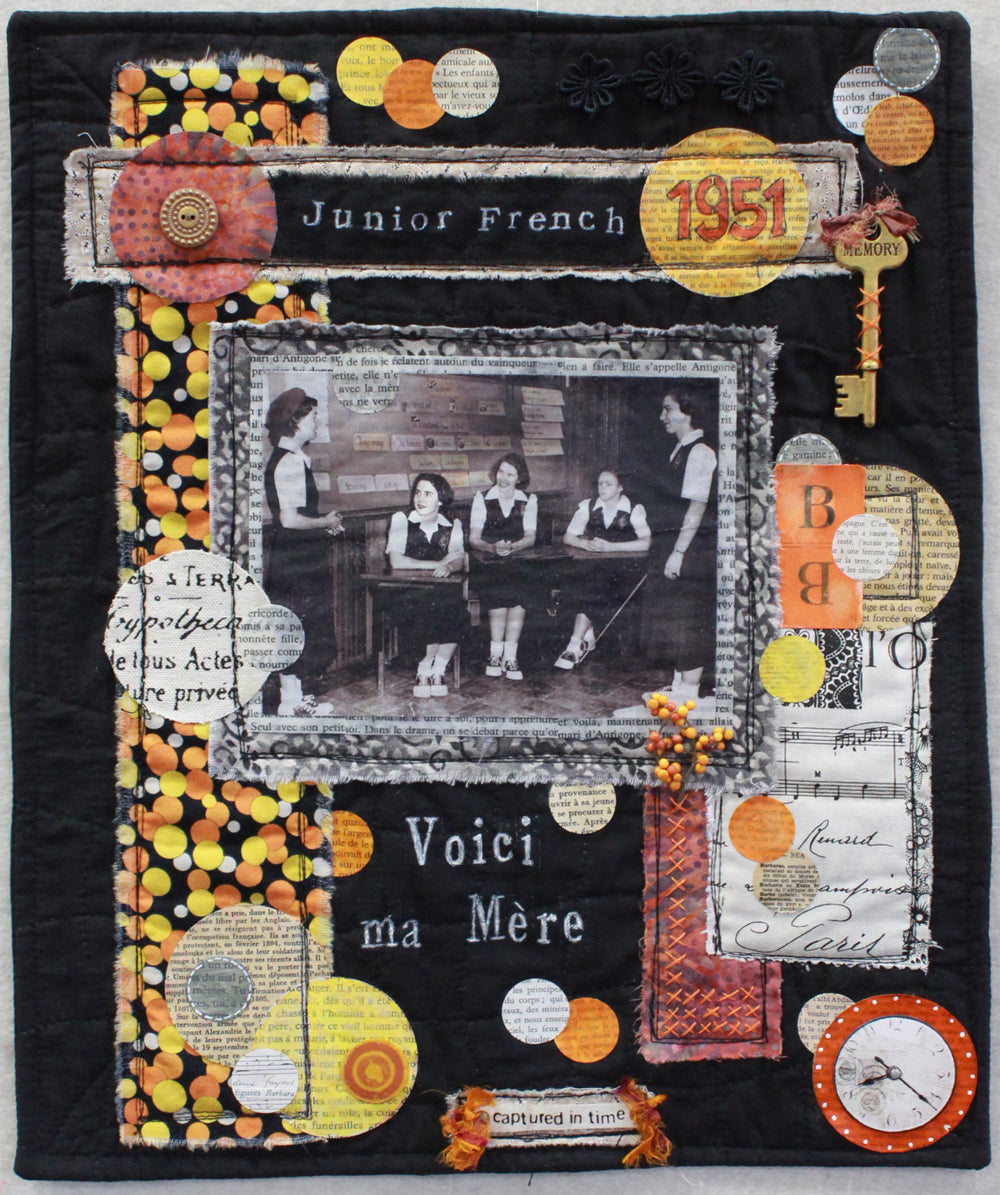
Voici ma Mère (Here is my mother) by Sharon McDonagh, Arlington QU whisper quilt challenge.
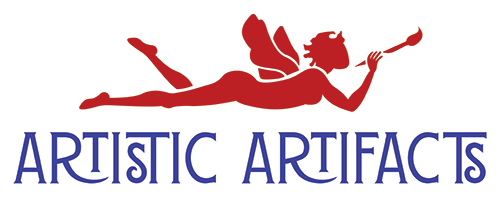


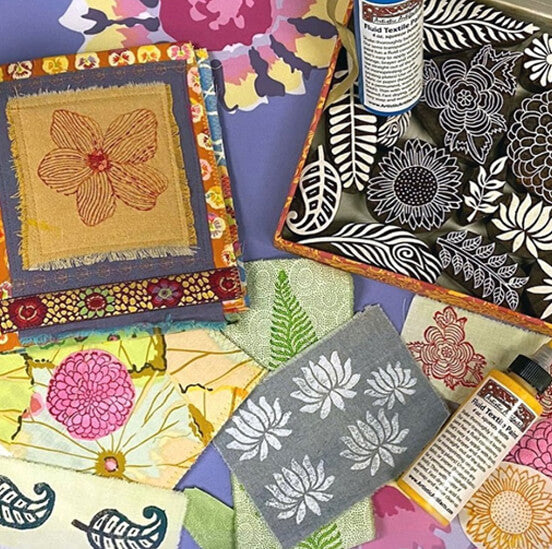


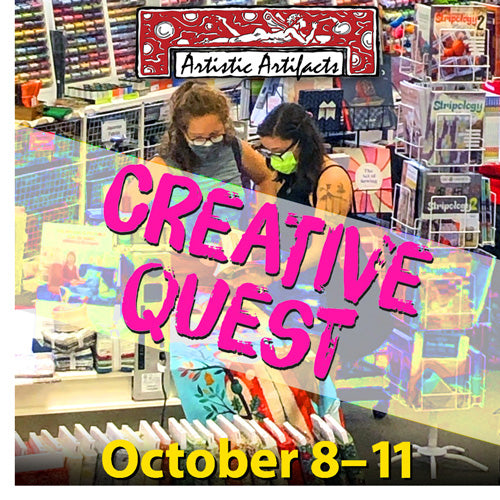
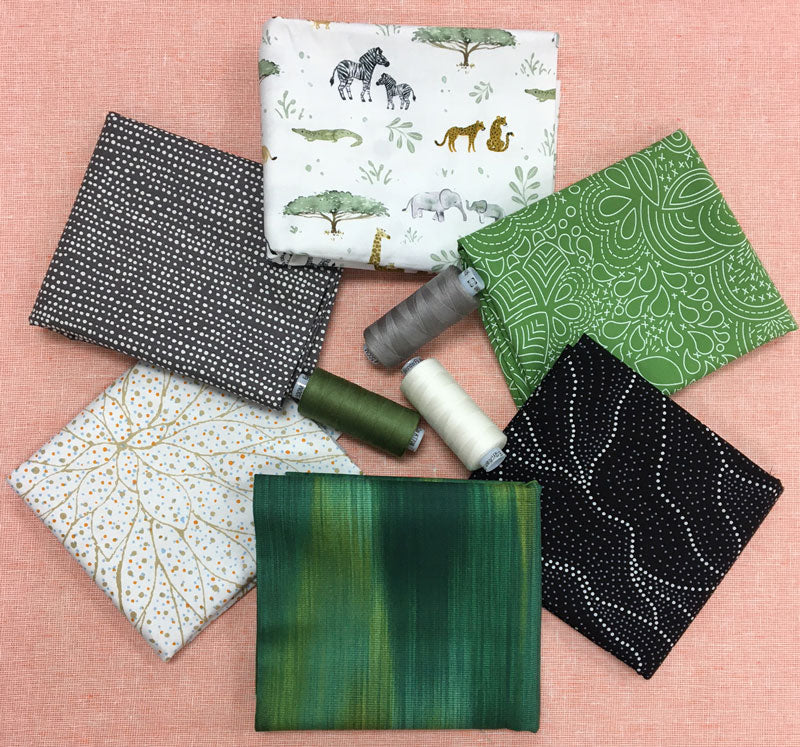
Leave a comment